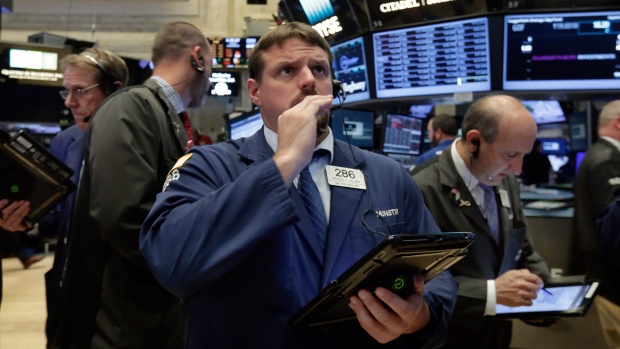Sep 27, 2016
TSX weighed by resource stocks as hopes of an OPEC output deal fade
, The Canadian Press

TORONTO -- Resource stocks were the biggest drag on the Toronto stock market Tuesday, as hopes of an output deal being reached between OPEC members dimmed and sent crude prices lower.
The S&P/TSX composite index pulled back 61.42 points to 14,558.04, as gold, energy and material stocks led declines.
The Canadian dollar gained 0.19 of a cent at 75.74 cents U.S.
Iranian oil minister Bijan Namdar Zanganeh said that an informal gathering of the Organization of the Petroleum Exporting Countries Wednesday in Algeria is just a "consultation meeting," playing down the chances of the countries coming to a consensus about capping or cutting oil production.
Zanganeh said such a decision would be made at the next official meeting in Vienna in November.
Some OPEC members have urged for a deal to be reached to control the glut and put a floor on falling energy prices.
"OPEC is designed to go around supply and demand and try to fix prices because of their needs," said Norman Levine, managing director at Portfolio Management Corp.
"But they need co-operation, and if Iran says they're not going to co-operate then the path of least resistance for now is down until it hits demand."
The November crude oil contract was down $1.26 at US$44.67 per barrel.
On Wall Street, indices headed higher following the first U.S. presidential debate.
In New York, the Dow Jones industrial average was up 133.47 points at 18,228.30, while the S&P 500 advanced 13.83 points to 2,159.93. The Nasdaq composite gained 48.22 points at 5,305.71.
Levine said the rally indicates that markets read the debate as a win for Democrat candidate Hillary Clinton over her rival Republican candidate Donald Trump.
Even so, he noted the gains were modest because the election is still weeks away. Voters don't head to polls until Nov. 8.
"It's still too early to get excited and say that Hillary will win, if that's what the market is looking for. But not everyone in the market hopes for Hillary," said Levine.
"But in general, investors view her as the lesser of the two evils."
U.S. indexes were also buoyed by the latest round of economic data.
The Conference Board reported that U.S. consumer confidence reached its highest level this month since August 2007. The group said its index rose to 104.1 as consumers grew more optimistic about the labour market. The result was better than expected.
Katie Nixon, chief investment officer for Northern Trust, said it's even more important right now because government spending, exports and capital spending by businesses are all limited.
"Everything's riding on the consumer right now," she said. Recently investors have worried about consumer spending because of disappointing auto sales and retail sales.
In commodities, the December gold contract fell $13.70 to US$1,330.40 an ounce, December copper contracts fell three cents to US$2.17 a pound, and the November natural gas contract dipped a penny to $3.05 per mmBtu.
With files from The Associated Press.








